For the detailed story about Jackson Barnett please consider purchasing
"The World's Richest Indian, The Scandal Over Jackson Barnett's Oil Fortune" by Tanis C. Thorne
"Not just the life story of Jackson Barnett, this is a story of the government's failure to meet its trust responsibility to protect 'restricted' or 'incompetent' Indians from those who preyed upon them and their oil-generated wealth. It is the story of the culture of greed that gripped early Oklahoma- - a complex, sad, and sometimes ugly story, masterfully told."- Daniel F. Littlefield, Jr., University of Arkansas at Little Rock More information about this book, it's author, and purchasing info is
available at the website of the publisher Oxford University Press, Click Here. | 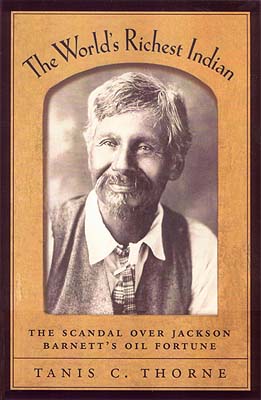 |
In the meantime...
| Jackson Barnett, the "Richest" Indian
The story about the "Richest" Indian in newspaper articles and pictures.
Documents & Links ...
What's new (Last updated 26 Aug 2023)
|
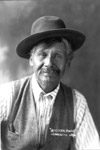
|
Jackson Barnett, Before The Money
This story starts in the early 1850s near Muskogee, Oklahoma with the birth of Jackson Barnett. Jackson's father, Siah Barnett, was a mixed-blood Creek Indian connected to the prominent Barnett family. Jackson's mother, "Thlesothle", was a mostly full-blood Creek Indian. Jackson's father and mother both belonged to the Tuckabatchee tribal town. [Barnett genealogy.]
Jackson was said to be a great lover of horses when young. It is said that sometime during his adolescence he was thrown off a horse and hit his head. This trauma apparently caused Jackson some damage which affected his future mental development. He evidently did not emotionally and intellectually develop well. He was described as having the mind of a child. He did not understand money or have social skills but was by all accounts a calm and unaffected person.
By the mid 1850s Siah and Thlesothle had separated and sometime after Siah and his new wife Mary migrated much further southwest near the town of Bryant in Okmulgee county. Jackson lived with and around his mother (who had remarried), his half-brother Tecumseh Andrew, and other maternal kin as was the traditional Indian custom. It is said that sometimes he would visit and stay with cousins near Humboldt, Kansas. Jackson worked for many years for John Leecher (his uncle), the owner of a ferry near Muskogee on the Arkansas River. Jackson's half-brother Tecumseh also worked on Leecher's ferry. Meanwhile his father Siah, his uncle Jim, and James Fife operated a store near Bryant
(dates unknown) near Bryant in southwestern Okmulgee county. They would travel regularly to Muskogee to pickup supplies and goods to sell in their store. It can only be assumed that during some of these trips Siah would visit with his son. In late June 1891 while operating the ferry Jackson's brother Tecumseh fell into the river and drowned. Word of Tecumseh's death eventually spread to relatives in Kansas and apparently the Barnetts at Bryant. It is said that Siah Barnett decided that he would go to Muskogee and bring Jackson back with him to Bryant.
When Jackson came to the Bryant neighborhood he lived with his half-siblings and cousins. Eventually his relatives built him a cabin but many times he would prefer to stay in the woods even in his increasing age. While Jackson would by choice or nature not take care of himself like a "normal" person he evidently was extremely resilient and healthy for he lived to a ripe age. The relatives no doubt felt a bit ashamed of their "strange" kin but still they cared enough to keep food and fire wood in his cabin if he needed it. By the time of the Dawes Enrollment in 1899 his relatives probably filled out the application for him. When it came to select an allotment Jackson refused to make a selection and an arbitrary allotment in Creek county was made for him. Jackson was declared legally incompetent by the Indian officials and a guardian was appointed to handle his affairs. His guardian allowed an oil company to drill on his allotment for oil and it was on this allotment that Jackson's future fortune would spring in 1912.
[Muskogee Times Democrat, 9 Feb 1916]
GUSHER COMES IN WHILE CREEK IS LOOSE IN WOODS
Cushing Allotment Develops 14,000 Barrel Well Today -- Owner Demented.
JACKSON BARNETT DOESN'T NEED
MONEY
Lives in a Cabin Near Henryetta, Where Relatives Take Food and Fuel, Which Are His Only Wants.
When Jackson Barnett, a demented Creek Indian, is running wild in the woods of Okmulgee county, down near Henryetta, the Gypsy Oil Company today brought in a 14,000 barrel oil well on Barnett's allotment in the Cushing Field.
A Telegram received at the United States Indian Agency here today brought the information that the gusher had been brought in on the Barnett allotment in the S2 of the SE4 of section 5-17-12. The drillers are unable to control the gusher, the telegram says, and oil is flowing from the well into a creek.
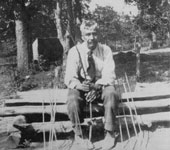 Barnett is a full-blood Creek. He has been declared an incompetent. He is not able to care for his property,
his mind is deranged, and he lives in a hut in the woods near Henryetta. He roams through the woods, living on herbs and bark, and what game he can kill. While he drew down oil royalties to the amount of $3,000 a month before the big gusher was brought in, he care nothing for money. He does not know what money means and does not care. All he wants is to be left alone to live his life his own way.
Barnett is a full-blood Creek. He has been declared an incompetent. He is not able to care for his property,
his mind is deranged, and he lives in a hut in the woods near Henryetta. He roams through the woods, living on herbs and bark, and what game he can kill. While he drew down oil royalties to the amount of $3,000 a month before the big gusher was brought in, he care nothing for money. He does not know what money means and does not care. All he wants is to be left alone to live his life his own way.
Relatives, it is said, let him wander, and always keep a supply of food and fuel in his cabin.
He has no children, and all the money that is coming in from his allotment will no doubt go to his brothers and sister. While he is alive the government is keeping his property intact and investing his surplus wealth.
[Muskogee Times Democrat, 10 May 1917]
ALLEN IS OPPOSED TO LIBERTY LOAN?
Washington, D.C., May 10- (Special) - Carl J. O'Hornett, guardian of Jackson Barnett, a full-blood Creek Indian of Henryetta, has appealed to Senator Owen and Congressman Hastings to intercede with the Department of the Interior to permit the investment of Barnett's $800,000 surplus cash in Liberty loan bond. The cash is idle in the sub-treasury of the United Sates but there is some doubt here about Indian
Commissioner and R. C. Allen approving the loan. It is suggested that Allen may not regard it as a safe investment.
[Muskogee Daily Phoenix, 8 June 1917]
WORLD'S RICHEST INDIAN TO BUY LIBERTY BONDS
Jackson Barnett's guardian file application for permission to buy $700,000 of them.
OKMULGEE, June 7-(Special) Application has been made to the department of the interior by Carl J. O'Hornett of Henryetta, guardian of Jackson Barnett, the wealthiest Indian in the United States, for permission to invest about $700,000 of Barnett's gold in Liberty bond.
Barnett holds an allotment in the Cushing field which yields him an income of more than $50,000 per month and he now has $755,000 on deposit in state and national banks in the United States treasury. His guardian desires to invest all of this money in the Liberty Loan. Barnett lives in a cabin near Tiger flats and spends about $60 per month.
[Muskogee Times-Democrat, 25 July 1919]
Barnett's gift of $25,000 to church is given approval
Washington, July 25 - The commissioner of Indian Affairs has approved the donation of $25,000 made the First Baptist Church of Henryetta, Okla. by Jackson Barnett. In addition to being a restricted Indian, Mr. Barnett's affairs are looked after by a guardian, which made the matter an extremely technical one. He is possessed of a fortune estimated at more than a million dollars, which was derived from oil royalties principally. He is unmarried and has no relatives. He is a member of the church receiving the donation and lives a very simple life with few wants or desires. The church is now constructing a new building at a cost of $50,000.
[Muskogee Daily Phoenix, 7 Sep 1919]
RICH INDIAN GIVES $25,000 TO CHURCH
Jackson Barnett's Next Gift Goes to Brother Who Fed Him When Poor
A check for $25,000 has been written by the cashier of the United States Indian agency, and will be mailed at once to the First Baptist church of Henryetta, of which the Reverend E. D. Cameron, former Muskogee preacher, is pastor.
This is a gift to the church by Jackson Barnett, wealthy Creek Indian, whose income is so large form oil royalty in the Cushing pool, that he will never be able to spend it during a lifetime.
Barnett is a member of the church and wanted to make a contribution for a new church building. Through the field agent he asked to be
allowed to make the gift, and it was approved by the department.
While he has no desire to die a poor man, Barnett is developing into a sort of philanthropist. But he cannot make any useless gifts, because he is a restricted Indian and all of his expenditures are checked by the Indian
superintendent at Muskogee.
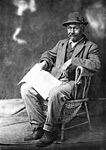 Jackson now has another gift which he will submit to the department for their approval. He wants to give $50,000 to his half-brother, Dave Barnett, who lives at Bryant, Okla. Dave Barnett is an old-time full-blood with long gray hair. He has not been fortunate in getting oil on his land, and he and his daughter are making a meager living from a hilly farm. Before oil was found on Jackson's land, his brother Dave fed and clothed him and took care of him when he was ill and in need. Now Jackson wants to do something for his brother.
Jackson now has another gift which he will submit to the department for their approval. He wants to give $50,000 to his half-brother, Dave Barnett, who lives at Bryant, Okla. Dave Barnett is an old-time full-blood with long gray hair. He has not been fortunate in getting oil on his land, and he and his daughter are making a meager living from a hilly farm. Before oil was found on Jackson's land, his brother Dave fed and clothed him and took care of him when he was ill and in need. Now Jackson wants to do something for his brother.
He wants him to have enough to live on during his life time, and wants to see that Dave's daughter receives a good education.
Dave was in Muskogee last week with Henry Harwell, postmaster at Bryant. He said that Jackson wanted to do something for him, and he came to ascertain the attitude of the department. He was told that if he was really a brother of Jackson, and his brother wished it, the gift would probably be approved.
Although the Indian office in Muskogee has handled hundreds of thousands of dollars of Jackson Barnett's money, the rich Indian has never been to Muskogee. He is now planning a trip here and call on the Indian officials, who are custodians of ...
Jackson's home built by his guardian Carl J. O'Hornett near Henryetta, Oklahoma.
[Muskogee Times Democrat, 31 Jan 1920]
RICH INDIAN DISAPPEARS WITH "BRIDE"
Jackson Barnett and "Kansas City Woman" Attempt to Get Married
Officers combing state for couple
Jackson Barnett, millionaire Indian incompetent and 70 years old, is trying to get married. In fact, he may be married at this time, although latest reports received at Muskogee indicate that the rich old man is still at large and single, despite his strenuous effort to break into the ranks of the benedicts. Reports said hem disappeared from his home at Henryetta with a woman companion either early Friday or late Thursday.
Comb State for Him.
Up to a late hour Saturday afternoon, the government had not been able to lay it's hand on Jackson and his near-bride, but the entire east-side of the state was being combed in an effort to locate the "marrying old couple." Reports at the Indian agency from Holdenville and Okemah were that Jackson and his companion, had been unable to secure a
license at either of those places but that probably would try at other places before despairing.
"It's all an attempt of some schemers to get hold of Jackson's money," declared Joe Strain, acting
superintendent for the Five Civilized Tribes who is trying to get in touch with Indian field clerks to get their assistance in foiling the couple. They know the old man won't last much longer and they have put this woman up to the trick so they come before the government with a claim on Jackson's millions and compromise for a few thousand dollars."
Ask for Licenses.
First reports of the attempt of the old couple to get married were received at the Indian agency late Friday. A telephone message from the field clerk at Okemah was to the effect that Jackson and his companion, "a middle-aged woman from Kansas City," were trying to get a
marriage license from the county clerk court. The court clerk has applied for information to the field clerk, who had put his foot down on the securing of the license.
Jackson was asked how long he had known the woman and why he wanted to get married.
Known Her Only a Day
"Oh, I got acquainted yesterday," he is reported to have said, "and I liked her pretty well, so though we'd get married."
The next call for help was from Holdenville early Saturday. The field clerk was told to notify other field clerks in neighboring counties and to spread the news among the other county officials in an effort to prevent the marriage.
Mr. Strain has notified Carl J. O'Hornett, Jackson's guardian at Henryetta, who is scouring the country to locate his ward. Other's have also been put on the couple's trail.
Barnett is about 70 years of age and has never married. His money came from dozens of oil wells located on his allotments from the government.
Many Seek His Money.
In the past few months various organizations have made efforts to get large donations form him, but were unsuccessful with the single exception of the Baptist church at Henryetta, which is to build a $25,000 structure with his money. Barnett's wealth is variously estimated at from $1,000,000 to $3,000,000.
[Muskogee Times Democrat, 23 Feb 1920]
BARNETT COIN IS TIED UP BY COURT ORDER
With Indian Missing, Williams Issues Injunction Against Charity Plan.
'Kidnaped' again by persistent 'lover'
With Jackson Barnett again missing - reported "kidnaped" by the same woman whose
first effort to marry him proved futile three weeks ago - an order restraining
Barnett's guardian and the Indian agency officials from allowing gifts to
charities of $1,500,000 from the old Indian's estate was issued Monday morning
by Federal Judge Robert Williams upon application of the National Surety
company. The hearing for a permanent injunction was set for Saturday
morning.
Disbursal of the million and a half dollars as proposed is
illegal and can not be carried through, insists the surety company, which is
bondsmen for the guardian, Carl J. O'Hornett of Henryetta and for David
Buddruss, cashier at the Indian Agency. Neither the guardian nor the
agency has any authority under the law to spend the money, it is alleged.
Also
named in the petition as a defendant is Gabe E. Parker, superintendent for the
Five Civilized Tribes. The surety company has been on O'Hornett's bond of
$25,000 since July 1912, it is claimed, while Buddrus' bond of $400,000 was
made in February 1913.
To Protect Bond Company.
"While this suit was filed simply to protect us,"
said Judge N. B. Maxey, attorney for the complainant, "we have been unable
to find any authority in law for such an expedition of funds. If the
courts decide against us, then we are protected at any rate.
According to
the petition, Barnett now has funds of about $1,5000,000 - practically the same
as the proposed gifts to charities.
Officials at Washington now are
revisiting former estimates of the amount to be expended on the proposed
charities, according to Mr. Parker, who returned Saturday. With the total
funds estimated at a million and a half, it is said that the expenditures will
be well under a million dollars - if they are made.
Gifts Total Million and Half.
Tentative plans call for the erection of an Indian hospital at
Henryetta with endowment of the institution. Gifts to churches and other
charities bring the amount up close to a million and a half dollars.
According
to Mr. Maxey, the "gift" of $25,000 recently made by Jackson Barnett
to a church in Henryetta was in the form of a loan and did not render the
bonding companies liable to collection for the amount
Woman Gave Two Names.
Henryetta, Oklah. Feb. 23 - (Special) Where is Jackson Barnett?
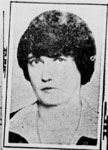 Believed to have been "kidnaped" Saturday night for the second time by a woman
who gives her name on some occasion as Ida Bartell of Oklahoma City and on
others as Mrs. Lowe of Kansas City, the aged Indian millionaire's whereabouts
today are veiled in obscurity.
Believed to have been "kidnaped" Saturday night for the second time by a woman
who gives her name on some occasion as Ida Bartell of Oklahoma City and on
others as Mrs. Lowe of Kansas City, the aged Indian millionaire's whereabouts
today are veiled in obscurity.
According to reports from Barnett's farm
six miles from here, the persistent "suitor" who failed in her first
attempt to get away with him about three weeks ago, called again about 8:30
o'clock Saturday night, invited the incompetent old man to "take a
ride" and whisked him away. The last that was seen of the
high-powered car was when it plunged into a swirl of dust with its hood pointing
north.
Sheriffs and other officers over all of eastern Oklahoma and
surrounding states were immediately notified but no trace of the
"elopers" has been found.
It is thought that the automobile was
a service car from Okmulgee but efforts to locate it have been futile.
The
first alleged attempt of the Bartell-Lowe woman to marry Barnett was frustrated
when then pair drove up to the courthouse in Holdenville about three weeks ago
to seek a license. A crowd recognised Barnett and the pair abandoned their
effort to get the license.
[Muskogee Times Democrat, 25 Feb 1920]
Jackson Barnett and Wife as Photographed at Coffeyville
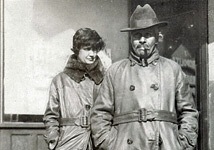 Jackson Barnett, millionaire Creek Indian of Henryetta, and Mrs. Anna Laura Lowe Barnett, who were married at Coffeyville, Kansas, Monday after a sensational "development", posed for the photographer at the request of the Times-Democrat correspondent yesterday morning, and the result is shown above. When the picture was taken both Barnett and his wife were clad in nobby leather coats which they wore when they left Henryetta in a motor car. The rakish tilt of Barnett's hat and the Barney Oldfield slant of his cigar would indicate that he is anything but displeased with his lot.
Jackson Barnett, millionaire Creek Indian of Henryetta, and Mrs. Anna Laura Lowe Barnett, who were married at Coffeyville, Kansas, Monday after a sensational "development", posed for the photographer at the request of the Times-Democrat correspondent yesterday morning, and the result is shown above. When the picture was taken both Barnett and his wife were clad in nobby leather coats which they wore when they left Henryetta in a motor car. The rakish tilt of Barnett's hat and the Barney Oldfield slant of his cigar would indicate that he is anything but displeased with his lot.
Guardian O'Hornett Finally Gets Conference with Barnett and His Bride; Result of Secret Meeting Not Disclosed; Pair Still in Coffeyville
Coffeyville, Kas. Feb. 25-(Special)-Overcoming the objections of Mrs. Anna Laura Lowe Barnett, bride since Monday of his 68-year-old Indian ward, Carl J. O'Hornett, Guardian of Jackson Barnett, gained entrance Wednesday morning into the honeymoon suite at a local hotel and held a conference with the elopers, whose sensational dash for the Kansas line Sunday night and the subsequent marriage Monday morning made more than one officer wonder were they got through.
O'Hornett had been denied admittance to the room of his ward Tuesday night by the bride, but Wednesday morning, accompanied by his attorneys, Nott and Welch of Coffeyville, he succeeded in negotiating with the Indian. The conference was conducted through attorneys McGugin and Keith, also of Coffeyville, who were hastily engaged by Mrs. Barnett. He did not succeed in seeing old Barnett alone as he had desired.
Mrs. Barnett hurled defiance at her husband's guardian and urged him to allow them to return to the Barnett home near Henryetta without molestation. Otherwise, she declared, they would not return. No answer to the ultimatum has been made by O'Hornett, it is understood.
Meanwhile the bridal couple are seemingly enjoying themselves despite the virtual surveillance to which they are subjected by the Coffeyville police and secret service men. They are, however, allowed their freedom and apparently have no though of worry.
[Muskogee Dailey Phoenix, 27 Feb 1920]
BARNETT'S BRIDE, REVOLVER IN HAND, BLOCKS KIDNAPERS
'Leap Year' Wife of Millionaire Indian Stands Careful, Defiant Guard Over Spouse
Millionaire is 'broke' but funds still keep coming
Officials Think Some Interested Third Party Is Financing Barnett's Defence -
Officers Here Mum.
Coffeyville, Kan. Feb. 26 - An attempt to kidnap Jackson
Barnett was frustrated here late this afternoon through quick action on the part
of his wife, according to employees at the hotel where the couple are living.
They
said that while Mrs. Barnett was using telephone on another floor, a large gray
touring car containing two young men drone to the curb outside a window where
Barnett could be seen sunning himself. Men in the car held up a fish pole
and pointing toward the river beyond the city they attracted the attention of
the Indian and as he was about to join them one of the party rushed into the
hotel to meet him. The wife appeared on the scene and shoving her husband
into his room turned on the intruders with a pistol.
Third attempt to steal him
This is a said to be the third attempt to kidnap or entice
Barnett away from the hotel. Her attorneys are said to have employed
private detectives from Kansas City to guard the couple.
In a statement
dictated to a porter Mrs. Barnett said: "Our home is in our apartment at
the hotel. I have the right to defend that home against any invader. I am
not a gun woman but the trespasser who crosses my threshold to assail my husband
may expect to be shot.
"We are through with Oklahoma, Kansas is our
home, and in Coffeyville, if possible. Oklahoma refused us our rights as
American citizens and Kansas accepted us, therefore we, will continue to make
Kansas our home."
One of Mrs. Barnett's attorneys left the city
today and, it is said, has gone to Wichita, Kansas, to apply to the federal
court for an injunction to prevent Carl J. O'Hornett of Henryetta, Okla.,
Barnett's guardian, or any government official from handling any of Barnett's
various funds pending the decision in the annulment proceedings which government
attorneys here gave notice would be started. The action is being held in
abeyance pending the arrival here of certified copies of the federal and
state court records from Muskogee showing Barnett has been adjudged incompetent.
Up to Kansas Jury
Harold McGugin, one of the attorneys for Mrs. Barnett,
today said he expected to institute legal proceedings should federal authorities
insist on annulment proceedings. His contention is that the Oklahoma
federal and state court decisions are not binding on the question of Barnett's
competency, but that a Kansas jury must pass on the matter before the marriage
can be set aside unless Barnett is taken from the Kansas jurisdiction. The
attorney said if Barnett should be kidnaped or enticed into Oklahoma then the
decision of that state would apply. If the question of sanity becomes an
issue it is expected both sides will bring alienists from all over the country
to give testimony as to Barnett's mental fitness.
Bride gets the money
Mrs. Barnett herself tonight denied a rumor that her husband
was without funds to fight the annulment proceedings. She is known to have
a preliminary sum of $1,000 wired to her credit yesterday, and it is said
several thousand dollars additional were to be brought here today. Federal
officials believe the ... [end of copy]
For background information about Anna Laura Lowe see this scandalous Confidential Report dated
28 April 1920.
[Muskogee Daily Phoenix, 7 Aug 1921]
JACKSON BARNETT IS 'STEPPIN' OUT,' HIS WIFIE AVERS
Orders Custom Made Sport Roadster and Will Build $300,000 Wigwam Here
Jackson Barnett, 'millionaire' Creek Indian is 'stepping out.'
He has been playing the ponies at the Windsor races at Detroit Mich., and now his wife, Anna Laura Barnett, who was accused of kidnapping him when they ran away to Coffeyville, Kans., and married, announces that Jackson is coming back to Muskogee and build himself a $300,000 wigwam.
Word of Jackson's mingling among the high steppers at Detroit reached Muskogee yesterday in the form of an interview with Mrs. Barnett.
Craves Speed
Mrs. Barnett declares in her interview that Jackson became so enthusiastic over the races that he has gone to Toronto to buy a fast horse, which he will train at Muskogee and enter in the Windsor races next year.
According to the statement credited to Mrs. Barnett there will be a 160 acre park around the $300,000 wigwam to be built there.
"We are going to have a swimming pool, a garage and a stable. We have already ordered a special made automobile. The house will be of stone and have a red tile roof. Our beautiful mahogany will cost $25,000. Jackson and I have been living long enough in a 30-acre homestead and in an ordinary cottage," according to the interview.
About the only trouble with "Chief" Barnett as husband, according to his wife, who says she is superlatively fond of him, "is that he insists on walking Indian fashion (single file) when we go down the avenue together.
Tell of Indian Traits
"He drops into his old habit often." she said, "and when he walks in front of me, as the Indians used to walk in front of the squaws, I am afraid he will be run over by automobile."
"Chief" refuses also to be
henpecked," she said. Silence, eternal silence, is his forte whenever his plans are
interfered with.
"I am the boss of the house," said Mrs. Barnett, "but I seem to do as the chief wishes."
Mrs. Barnett told the reporter the chief is now being allowed $600 a month by the government, but she expects the Harding administration will allow him $50,000 a year out of his enormous income.
On the night of 18 Dec 1921 Jackson and Anna
began moving furnishings to a newly purchased cement block home west of
Muskogee, Oklahoma.
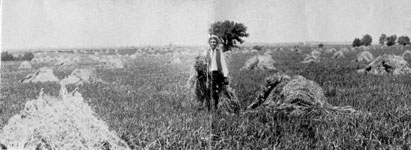
Jackson on his newly bought farm, on West Okmulgee
Avenue, Muskogee, OK 1922. |
|
|
|
[Muskogee Daily Phoenix, 2 Feb 1923]
$1,100,000 DIVIDED BETWEEN HIS WIFE AND SCHOOLS
$550,000 Endowment Fund For Bacone, Murrow From Which he Draws $20,000
GETS PART OF INTEREST FROM WIFE'S TRUST FUND
Agreement to Foil 'Schemers' Reached in Washington and Assures Him $50,000 Yearly Spending Cash
Jackson Barnett yesterday voluntarily stripped himself of most of his wealth.
He
signed away more than a million dollars and for the remainder of his life must
be content with an income of about $50,000 a year. Mrs. Barnett is given
outright $550,000. With another $550,000 is created an endowment fund for
Bacone College at Muskogee and the Murrow Indian orphan's home. This sum
is given to the Baptist home mission society of New York, which had
administration control over Bacone and the Murrow home.
Announcement of the agreement was made in Washington yesterday. It was reached at a
conference of the Barnetts with Charles H. Burke, commissioner of Indian
affairs, Victor Locke, superintendent of the Five Civilized Tribes and A. J.
Ward, tribal attorney.
At His Own Request
The various trust
agreements involved were made, according to Mr. Burke, "because designing
persons" sought not only to gain control of his property now but were
scheming to make claims after his death.
Bacone college now will have the
largest endowment of any state educational institution, Dr. B. D. Weeks
superintendent, said last night. He had been awaiting for several weeks
announcement of the agreement which was the primary purpose of the Barnetts'
visit to Washington.
Disposal of Barnett's fortune was arranged at his
request to keep it out of the hands of these "designing persons" when
he dies, Burke stated in Washington.
The plan assures Barnett an income
of $50,000 a year during his life and disposes of the bulk of his estate,
including his allotment in the Cushing oil pool of Oklahoma, and liberty bonds
and cash approximating $1,500,000.
In Sensational Marriage
Barnett, who has no living relatives with legal or moral claims upon him, according to
Burkes's announcement, has been in the public eye more prominently perhaps than
any other Indian, not only because of his great wealth but because of his
sensational marriage about three (sic) years ago when his bride is alleged to
have kidnaped him from his guardian in Oklahoma and taken him to Kansas, where
they were married. They recently purchased a home at Forty-eight street
and Okmulgee avenue.
Out of the $550,000 gift to Mrs. Barnett, she
establishes a trust fund of $200,000 through a Washington bank with the
provision that Barnett is to receive $7,500 of the annual income.
The
entire gift to the mission society is deposited with a New York trust company
which agrees to pay him $20,000 a year from its proceeds as long as he lives.
It
is explained that the gift to the society, which will go to its permanent
endowment fund, is not a denominational or church donation but is made solely
because the organization has administrative control over Bacone college and the
Murrow home.
To Balk Varied Schemers
Barnett, in addition to the $27,500 a year thus assured to him
from these two gifts, retains title to his allotment in the Cushing oil field
which is bringing him more than $18,000 annually, and is receiving about $5,000
a year interest on loans which have been made.
According to Commissioner
Burke, Jackson's wealth seems to have been a magnet attracting designing persons
of every character from all parts of the country. Indian department
official have been called upon to devote much time and energy in the thwarting
of impossible and fantastic schemes to secure his wealth.
"Definite
knowledge has recently come," Burke said, "to the Indian office
officials that the grafters are not content with making encroachments on this
estate during the lifetime of its owner, but have gone so far as to hunt up
persons who will claim to be his heirs upon his death and have secured from them
contracts for 50 percent of their interest in his estate and which claims will be prosecuted when Jackson Barnett dies.
[The Evening Star, Washington D.C. - 9 Feb 1923]
Muskogee, Okla.
February 9 - Jackson Barnett, the world's richest Indian, has returned to his
own. Harking back to the camp fire days, the aged Indian last night
discarded the modern civilization of beds and silk pajamas for slumber on a rude
pallet of quilts before the flickering great fire in the living room of his
$30,000 bungalow.
Can Do as He Pleases - Jackson, for the first
time in over two years, is alone and can do just as he pleases. His wife,
to whom he recently deed $550,000 in cash and liberty bonds, has left with her
daughter, Miss Maxine Lowe, for Los Angeles. Jackson said that his wife had
wanted him to go to California and live since their trip to the west coast last
summer, but he refused, because "it was too far from home".
Wife Get
Most - Under the terms by which the wealthy Indian disposed of his fortune
recently Mrs. Barnett was deeded $550,000, of which she placed $200,000 in
trustship for his benefit, the principal to revert to her on his death. She
holds the remaining $350,000 outright. Jackson from this income of $50,000
a year. A reporter called at Barnett's home, a mile from Muskogee, and
obtained the first interview ever granted by Barnett when his wife was not
present. The old Indian arose from a rude bunk he had made before the fire
in his living room to receive the interviewer.
Against Fighting -
When questioned regarding the recent disposal of his fortune, which was effected
in Washington, he said: "Well, they give me lot over here near Sapulpa an' they
find oil well on it. Lot of Money. I got plenty money long as I
live, an' they say no use to have 'em fight over it after I'm dead. So we
fix it so there won't be none lef''
[Muskogee Daily Phoenix and Times Democrat, 9 Feb 1923 Friday]
Jackson
Barnett's In Blissful Solitude As Wife Goes West; 'Just Leave Me Alone'
Stretched Before Fire in Luxurious Living Room, Shorn of Silken Pajamas,
Millionaire Indian Is Happy Again; Grunts Cryptic Comment on Disposal of Wealth
and There Isn't A Worry in His Mind
Jackson Barnett has returned to his
own. Harkening back to campfire days the millionaire Indian discarded the modern
civilization of beds and silk pajamas and spent last night in honest slumber on
a rude pallet of quilts before the flickering grate fire in the living room of
his $30,000 bungalow. For Jackson, for the first time in over two years, is
alone and can do just as he pleases with his $50,000 a year income. His wife, to
whom he recently deeded $550,000 in cash and liberty bonds, left Tuesday,
morning with her daughter. Miss Maxine Lowe, for Los Angeles, it was learned
yesterday. Jackson said last night that his wife had waited him to go to
California to live ever since their trip to the west coast last summer, but he
refused because it was "too far from home."
Hunts for His Trousers
A reporter called at Jackson's home a mile west of Muskogee last night and
obtained the first interview ever granted by Jackson when his wife was not
present. Clad in heavy cotton underwear, instead of the silk pajamas, he
acquired with his riches, the aged Indian arose from, a rude pallet of quilts he
had made before the fire in his living room. He invited the reporter to have a
chair and hunted for his trousers. When he had found them he took a seat in the
opposite corner and talked in gutteral monosyllables. When asked how long his
wife was to be gone he replied: "She say she be gone 'bout two weeks," and
yawned sleepily. Throughout the visit the room was illuminated only by the"
flames in the grate. The old Indian sat before the fire, his face lighted by the
ruddy glow, apparently never thinking of the electric switch at his elbow.
Doesn't Like to Travel
Flickering shadows danced upon the
walls of the richly furnished room, revealing tasteful pictures, costly
furniture and expensive rugs. He was reticent and apparently did not want to
talk. But after a time he thawed out and, in the halting, mumbling guttural of
the old time full-blood Indian, told his story. "She want me to move to
California ever since we go out there that time las' summer. I don't like it out
there, though. The climate don't agree with me. Too far from home.
"I tell
her, 'spose I get sick out there?' But she's all time wants to go. "So las'
Tuesday she's catch the train and go. She said she wanted to put her daughter in
school-" Jackson's voice trailed off in another prodigious yawn - "but I try to
get her go to school somewhere around here. "Then we go off to Washington. I
catch cold up there. Ain't feel good since. Don't like to travel around all the
time, no how." Jackson is apparently untroubled by his wife's visit. All
he wants is to be left alone. He has always shrunk from the social duties that
evolve upon a millionaire, and has continually objected to travel. On one
occasion on the tour last summer he slipped away from his wife in Coffeyville,
Kan., and attempted to bribe a railroad conductor to bring him back to Muskogee.
He had no funds for a ticket as his wife was carrying the family bank roll. He
has never before appeared in public without his wife since their marriage two
years ago. Yesterday he was seen dining in a restaurant alone for the first
time. When asked his age he replied: "I dunno. Some say 50, some say 60 and some
say 70. I guess 50 mus' be right." he added after a moment's reflection.
Back to His Quilts
When questioned regarding the recent disposal
of his fortune, he said: "Well they give me lot over here near Sapulpa an' they
find oil well on it. Lot of money. I get plenty money" long as I live an they
say no use to have 'em fight over it after I'm dead. So we fix it so there won't
be none lef'." Whether or not the separation is permanent Jackson does not know
and apparently does not care. When his wife insisted that they go to California
to live he rebelled. "I tell her if she want to live in California go
ahead, but I'm goin' stay here. And that's all there is to it."
And
biding the reporter good night Jackson retired once more to his pallet of quilts
before the flickering grate and prepared to spend the night in real comfort.
[The Fresno Morning Republican, 23 Feb 1923]
[clip] "... Mrs. Barnett
returned to Muskogee, Oklahoma last week after a short business trip to Los
Angeles..."
In Feb-May 1923 Anna buys their first California house at 1410 Norman Way W,
Santa Monica, California. The 1925 Santa Monica City Directory records the
Barnetts living at this address. By 1925 or 1926 they left this house and
moved into the mansion at 644 S. Rossmore where it joins Wilshire Blvd. By
1927 Norman Way had been renamed as Bundy Drive N and renumbered as part of the
400 block per neighbors.
1923 house on Norman Way.
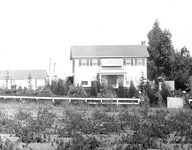 |
1926 mansion on Wilshire Blvd.
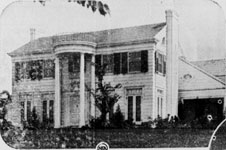 |
[Muskogee Times Democrat, 31 May 1923]
BARNETTS BUY NEW RESIDENCE
But This Time It's In California Where They Intend to Remain
Carl J. O'Hornett of Henryetta, guardian in name only of Jackson Barnett, wealthy Creek Indian, will have to hurry if he expects to recover any of that $550,000 awarded Mrs. Barnett in the recent settlement of Barnett's estate.
News has been received in Muskogee of the purchase by Mrs. Barnett of a palatial residence in Los Angeles. At the office of the commissioner of the Five
Civilized Tribes, it was stated that if the report of the purchase is true, Mrs. Barnett acted entirely without the knowledge of the Indian office.
Immediately after the distribution of Jackson Barnett's fortune in Washington last winter, Mrs. Barnett went immediately to California, leaving her husband in Muskogee. She made one or two other trips to the Pacific coast before packing up the family trinkets and departing for a long stay. The news of a purchase of a California home by Mrs. Barnett confirms rumors that the Barnetts intend to reside just as far from Oklahoma and it's probate courts as they can get.
Attacked Distribution
O'Hornett is attacking in the federal courts the distribution of Barnett's fortune on the ground that he as guardian was consulted and did not approve the settlement. For a long time prior to the actual division of the estate, O'Hornett was ignored by the Indian offices in the handling of Barnett's affairs. By his court actions the guardian would have paid into his hands the more than a million dollars involved in the Washington settlement under which Bacone College and Mrs. Barnett were the chief beneficiaries.
The Muskogee Indian offices still are sending Barnett his monthly allowance of $2,500. It is remitted to a Los Angeles bank with which the Barnetts have made financial transactions.
[Press-Telegram 18 Jul 1923, Wed. - Page 22]
Rich Indian Flees From
Oklahoma to Escape Attorneys - New Found Wealth Brings Woes to Once Poor and
Contented Redskin.
MUSKOGEE, Okla. - Jackson Barnett, America's richest
Indian, has fled from the land of his fathers. The little farm cottage
near Muskogee that was the home of the wealthy Creek and his white wife, has
been dosed indefinitely. There is no response to the knock of the
inquisitive at the door - Jackson Barnett has turned his face toward California.
"'Too much publicity," say lawyers, grown gray
in what is known in
Oklahoma as "Indian litigation". "Too much litigation," say others
finally as wise
Before countless oil derricks "mushroomed" into
existence over the lands of Barnett, he lived alone In his shanty near
Henryetta. He farmed when he felt like it. When he didn't he made bows and
arrows, or pipes from sassafras root or played with his dogs. |
Then
wealth came with it's discomforts. The new home here was an improvement over the
tiny cabin at Henryetta. but lawyers began to invade his home.
Wills to
be made, papers to sign, questions to answer - for Jackson was getting old.
Birth records are almost unknown among the Creeks, but Jackson is drawing near
the allotted three score and ten.
Litigation over his enormous wealth
palled upon the aged Creek. California was looked upon as a haven and there the
wealthy exile veteran fled with his wife to spend
his declining days in quiet
and sunshine.
But they say Jackson Harnett is happiest when, In the
evenings, he can divest himself of coat and shoes and sit dreaming before an
open fire, as his ancestors have dreamed through the centuries of American
civilization.
The Los Angeles Times, 2 March 1925, Monday [story]
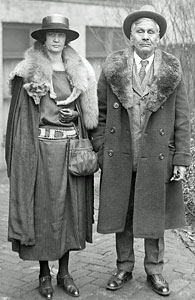 RED AND WHITE UNION SUCCESS
RED AND WHITE UNION SUCCESS
Indian
Millionaire and Mate Happy - Jackson
Barnett and His White Wife
Living comfortably in a handsome home at 1410
Norman Way, near Beverly Hills is Jackson Barnett, full-blooded Creek Indian,
and his white wife. Anna Laura Barnett. Barnett became wealthy suddenly when
rich oil and gas wells were developed on his property In Oklahoma.
In 1922 his
fortune reached the sum of $1,500,000, of Which the Department of the Interior
Invented $1,100,000 in Liberty bonds.
Just now the pair are involved In a
suit by means of which they seek to recover several hundred thousand dollars
from the Equitable Trust Company of New York.
It being asserted that the
company has failed to pay income on the account, declaring that Elmer S. Bailey
is a legal guardian of the Indian. Barnett himself can neither read nor write.
The Barnetts declare that they are
perfectly happy and that their marriage has been a true romance.
[Article photo was published by 1923.] [A story from 14 Jan 1925
and the 1925 city directory confirms he was living at 1410 Norman Way in Santa
Monica]
[The Modesto Bee, 17 April 1925]
Wealthy Indian Fails To
Attend Hearing - Okmulgee, Okla., April 16 - Attorneys here representing
Jackson Barnett, wealthy Creek Indian, in his petition on file in district court
to remove the guardianship over him, said today they expected Barnett and his
wife to appear when hearing on the petition is held April 23. Hearing on
petition, was postponed yesterday by Judge W. A. Barnett, when Barnett failed to
appear in court. Barnett's attorneys were unable to explain Barnett's
failure to appear. Barnett and his wife have made their home in Los
Angeles, California, for the past two years.
"It was while Barnett was "directing" traffic, that he was
taken by a deputy United States marshal, on August 20, 1926, to Muskogee,
Washington and New York for court and Senate hearings. At that time Charles H.
Burke, former Commissioner of Indian Affairs, testified Barnett had an Income of
$67,000 a year and had $500,000 in cash and securities..."
Los Angeles, Calif.,
20 Aug 1926 - "Jackson Barnett, known as 'the world's wealthiest Indian.'
was being speeded eastward by automobile today bound for Muskogee, Okla.
where he is charged with failing to obey a subpoena before a grand jury,
while his white wife, Mrs. Anna Laura Barnett, was clamoring at the
district attorney's office here for the arrest of his supposed kidnapers."
"Barnett, who is 76 years old, was seized at his home here today on a writ
of attachment issued by the Muskogee federal court..."
Los Angeles
Times, 24 Nov 1926 - "New York, Nov. 23 (AP) - Jackson Barnett, aged Creek
Indian, who signed away $1,100,000 with a thumbprint, must take the
witness stand to demonstrate his own mental competency in the equity action
to determine the validity of his donations to the American Baptist Home
Mission Society and his white wife..."
Los Angeles Times, 18 Dec
1926 - "Jackson Barnett, wife back in L.A. Jackson Barnett, 76-year-old
wealthy Creek Indian, and his white wife, Anna Laura Lowe, whose married
life has been a stormy affair owing to the insistent interference of
government agents, are back in Los Angeles today."
The following photos
may have been taken around this time. In the middle photo they are with
the Commissioner of Indian Affairs Charles Burke.
[Long Beach Sun, 12 Jan 1931]
Jackson Barnett, Wealthy Indian,
Amuses Self and Film City as Traffic Cop
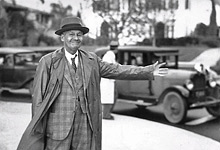 By JESSIE
HENDERSON HOLLYWOOD. Jan. 10 (CPA) — Jackson Barnett, millionaire Indian chief,
has voluntarily become a Hollywood traffic cop. His appointment is not official.
Chief Barnett appointed himself. He's getting away with it, too. Nearly every
afternoon, the elderly Cherokee brave in business suit and black felt hat
stations himself on a corner of Sunset boulevard opposite his home. When he
became a millionaire, the chief picked on Hollywood as the most amusing place in
the world in which to settle down. He didn't want to go into pictures, he just
wanted a nice home on a central street where he could watch the Hollywoodians go
by. Toward that end he purchased a white colonial mansion with pillars.
By JESSIE
HENDERSON HOLLYWOOD. Jan. 10 (CPA) — Jackson Barnett, millionaire Indian chief,
has voluntarily become a Hollywood traffic cop. His appointment is not official.
Chief Barnett appointed himself. He's getting away with it, too. Nearly every
afternoon, the elderly Cherokee brave in business suit and black felt hat
stations himself on a corner of Sunset boulevard opposite his home. When he
became a millionaire, the chief picked on Hollywood as the most amusing place in
the world in which to settle down. He didn't want to go into pictures, he just
wanted a nice home on a central street where he could watch the Hollywoodians go
by. Toward that end he purchased a white colonial mansion with pillars.
Pretty soon, however, chief Barnett decided that he wanted to be in the thick of
things like the other
Hollywoodians. No, he didn't care about posing before a camera. Traffic cops
were in the thick of things more than anybody else, and longer. With irrefutable
aboriginal logic Chief Barnett figured that a Hollywood traffic cop doesn't need
to wear himself out going places and seeing people. A Hollywood traffic cop
stays right in one place and all the screen celebrities of the cinema capital
sooner or later come beneath his gaze. Chief Barnett observed what other
visitors had missed; that the traffic cop is the uncrowned king of cinemaville.
In fact nobody dares to crown him.
O.K. said Chief Barnett in the lingo
of Hollywood, I'll be a traffic cop. The idea struck him one bright afternoon
recently, but filing application, obtaining a uniform, taking examinations, and
all the other piffling preliminaries seemed a waste of time. Why not jump the
prologue and step right into the act? O. K. said Chief Barnett, I am a traffic
cop.
Accordingly he took his stand on a vacant lot facing the white
pillars of his colonial home and began to direct traffic. Thousands of cars pass
this corner in the course of an afternoon and to each car Chief Barnett gives a
beckoning wave or a lordly halt signal. Most of the drivers do not even see the
erect, dignified figure on the edge of the field, but Chief Barnett directs 'em
just the same. If they don't halt when he commands them to halt, he commands
them to go ahead. The point is, he commands I them anyway and should his signals
conflict with the traffic lights, who cares? Certainly not the chief.
Hours on end he spends waving his arms in high glee, to the high glee of several
dozen commuting motorists who have happened to observe him daily in the same
place at the same time and who now invariably greets his gestures with a genial
honk of the horn. Each honk is acknowledged by a salute from the chief. He has
become not only a local personage but a figure that might well epitomize the
spirit of Hollywood.
Asked why he picked this recreation from among the
diverse amusements to which his millions gave him access, Chief Barnett made the
unanswerable reply. "I like it," he said.
[Los Angeles Evening
Post, 16 Oct 1931]
[Muskogee Daily Phoenix,
May 30, 1934]
Jackson Barnett, Whom Oklahoma Enriched but Couldn't Educate
Dies in Palatial Home; Not a Cent to Woman Who "Kidnapped" Him
Mrs. Barnett Found Jackson, 70, Living As Though Penniless
When Oil Was Found on His Land, Indian "Became Shuttlecock in Game of Battledore"
Jackson Barnett lived for 70 years in his shack near Henryetta with his dogs and ponies, and until he became wealthy was allowed to shift for himself and eke out an existence as best he could. Even when fortune came to him and oil that yielded a monthly income of $90,000 was discovered on his allotment in Creek county, Barnett refused to leave his home or change his mode of living.
With the discovery of oil on his apparently worthless land in the Cushing field, however, Barnett became, as described by Federal Judge John C. Knox of New York, "a shuttlecock in a game of battledore in which the stakes were high." Known as the "world's richest Indian" Barnett was solicited and importuned for donations, kidnapped, and married by an adventuress, and harassed and annoyed by his attorneys."
Thought Him a "Bit Off"
Barnett suddenly found himself thrust into the national spotlight, but apparently suffered none from it. His Creek neighbors around Henryetta thought the old man a bit "off", but excused his incompetence on the grounds that he had been thrown from a horse as a youth.
An Okmulgee county court appointed Carl J. O'Hornett as Barnett's guardian. O'Hornett approved a grant of $25,000 to several Henryetta churches and struggled to protect an ever mounting fortune that 10 years later was estimated at three million dollars or more.
Barnett's fortune has rocked national administrations, resulted in kidnapping, demands for impeachment and Senatorial investigations. Annie Laura Lowe, a Kansas oil promoter, drove to Henryetta in a taxicab, found the aged millionaire and whisked him across the Kansas line to marry him.
Gave $550,000 to Bacone
Against that marriage the Indian bureau cried in protest. It sought first to set it aside, finally acknowledged it, only to see it declared void by Judge William P. James in the Los Angeles federal court recently.
After his marriage to Mrs. Lowe Barnett continued as a philanthropist. He sough to create two trust funds of $550,000 each, one two go to his wife at his death and the second to go to the American Baptist Home Mission of New York for the use and benefit of Bacone college in Muskogee. Jackson, according to the agreement, was to have an interest in both trust funds as long as he lived.
The settlement was approved by the department of interior, but subsequently attacked by Oklahoma lawyers and the department of justice. Harold McGugin, long Mrs. Barnett lawyer, now a member of the house of representatives from Kansas and who at one time was given a $50,000 fee only to be ordered to return it by federal court, charged in a direct appeal to President Coolidge on September 19, 1926, that Senator W. B. Pine of Okmulgee had exerted his influence with the department of justice to intervene against the interior department's settlement of the case in an effort to keep Barnett's money in Okmulgee county.
McGugin charged that Pine's political group was dominant in Okmulgee county and had influenced the appointment of various guardians for the aged Creek
incompetent's estate.
Lived in Local Hotel
McGugin voiced a plea of "let Barnett alone" to president Coolidge. He demanded, at the same time, the resignation of Bert M. Parmenter of Lawton as assistant attorney general, Pine had demanded the resignation of Indian Commissioner Burke, who had approved the Barnett settlement.
Mrs. Barnett suddenly bundled up the "chief" and hurried him to Los Angeles, purportedly to protect him from further suits. The aged Creek however was returned to Muskogee where, with Mrs. Barnett, he was held virtual prisoner in the Baltimore hotel by three guards to await his release on bond.
Because Federal Judge Robert L. Williams was confined to a Battlecreek sanitarium as a result of a serious operation, Federal Judge F. E. Kennamer of Tulsa released Barnett on a $2500 bond on September 26, 1926, over vigorous protest from the department of justice. Mrs. Barnett was said at the time to have kept an automobile waiting daily in front of the federal building here in an effort to make an anticipated dash to California, but was warned by Judge Kennamer that she would not be allowed to leave the eastern district of Oklahoma.
Lived on West Okmulgee
Following his release on bond, Barnett and his wife left the Baltimore and took up residence in a cottage on West Okmulgee
Judge Knox of New York subsequently held that donations to Bacone and to his wife were void, and ordered Barnett's estate turned over to the department of interior for administration on the ground that the aged Creek was incompetent and had married an adventuress.
Barnett and his wife returned to Los Angeles, still faced with government efforts to void the marriage with which Barnett was apparently content, and took up their residence in their palatial colonial home on Wilshire Boulevard. Barnett contented himself with directing traffic from the curb in front of his mansion.
Judge William P. James of Los Angeles, held recently that the marriage of Mrs. Lowe and Barnett was void, but allowed Jackson the privilege of employing his wife as a housekeeper at $2500 per month.
Apparently dissatisfied with the handling of her expense account by the Mission Indian Agency, Mrs. Barnett came to Muskogee two weeks ago seeking to file a motion in federal court to require payment through the office of the Five Civilised Tribes her. Because she had no suit before Judge Williams in which she could file a motion, Mrs. Barnett returned to her home in California.
[Muskogee Daily Phoenix, June 3, 1934]
BARNETT'S DEATH CLOSES ONE STORY AND OPENS SECOND
Jackson Lived Alone Near Henryetta Until Gold Rushed From
Scrubby Acreage
FOUND BY 'ADVENTURESS'
Battle for Indian Millions Just Starting, a Heirs Flock to Agency Here.
The death of Jackson Barnett
last week brought to a sudden close one of the strangest and at the same time
one of the sordidly romantic stories in the history of the rich Creek nation and
began another.
Jackson Barnett was "the world's richest
Indian". As oil gushed forth from his 160 acres in Creek county -
land that had been given up as unproductive, and which had been allotted him as
punishment for his participation in the ill-fated "Crazy Snake" rebellion
- Barnett's fortune was estimated at $90,000 per month, and 10 years later, as
oil continued to pour from his properties, it was still estimated at more than
three million dollars.
At his death, Jackson Barnett enjoyed a monthly
income of $2,500 and had more than $1,900,000 on deposit with the superintendent
of the Five Civilized Tribes.
For 70 years Jackson lived among his dogs
and ponies in a log cabin shack near Henryetta. Unkept, unlettered, dirty,
the millionaire Creek was considered a "scrub" Indian, unable to meet
the requirements of the Creek tribe. An outcast, Jackson lived alone until
"black gold" poured out of his allotment.
It was there that
Anna Laura Lowe, a Kansas oil promoter, found him, and rushed the millionaire
"scrub" across the Kansas state line to marry him. Mrs. Lowe is
reported to have made several trips to Barnett's cabin to woo the aged Creek
incompetent. Jackson later said that he refused several times to marry
Mrs. Lowe, an attractive white widow, because she called when it was
"getting dark."
Against that marriage the Indian bureau cried
in protest. They insisted that Jackson was incompetent, did not understand
the intent of marriage vows, and that the extent of his participation in the
marriage ceremony had been a "grunt and a grin."
Need Other Kidnapers
Mrs. Barnett, the former Mrs. Lowe fought back with quiet
and sullen fury. She insisted that she had done more for Jackson than the
government had ever done.
"If I kidnaped him," she insisted,
"the government ought to hire other women like me to go out and kidnap the
rest of the Indians."
The Barnett's - now central figures in a drama
of riches that whirled about the unperturbed head of the childish old
millionaire - moved to Muskogee to take up their residence as the department of
interior continued its efforts to annul their marriage.
Never seriously
concerned in any of the litigation to which he became a placid onlooker, Jackson
insisted that he "liked" his wife and was willing to share his fortune
with her.
"She smart woman" he said, "she count my
money." Barnett once attempted to estimate his fortune by the number
of ponies it would buy.
Harassed by attorneys, Mrs. Barnett suddenly
bundled up the "chief" and hurried him to California to a mansion at
the corner of Wilshire Boulevard. The step was taken, she insisted, to
protect the "chief" against the ravages of further litigations.
In
California, the aged Barnett found new interest in life. Mrs. Barnett
provided him with his loved calico ponies, and allowed him to stand daily on the
parking as he directed traffic.
Held Prisoner Here
But Jackson was
not allowed to remain in California. Insisting that they had been
kidnaped, the Barnetts were pushed back into Oklahoma and held virtual prisoners
in the Baltimore hotel here pending disposition of their affairs before the eastern district of Oklahoma federal court.
Because
Federal Judge Robert L. Williams was confined to a Battle Creek hospital at the
time, Federal Judge F. E. Kennamer of Tulsa released Barnett on a $2,500 bond,
warning Mrs. Barnett at the same time that criminal prosecutions would be
brought against her if she attempted to take her "husband" back to the
coast.
Mrs. Barnett was said at that time to have kept a automobile in
front of the Muskogee federal building preparatory to a dash back to their Los
Angeles mansion, but reconsidered in view of Judge Kennamer's lashing warning
and engaged a cottage in Muskogee on West Broadway.
Back to California,
the Barnett wrangle continued unabated as the department of interior insisted
that the "faked marriage" should be annulled. Despite the fact
that the couple had lived as husband and wife for more than 13 years, the
government continued its efforts to secure an annulment and to denounce Mrs.
Barnett as an imposter.
Marriage Held Void
On March 31, 1934,
Federal Judge William P. James of Los Angeles declared the marriage void.
It was a shock not only to Mrs. Barnett and to the unperturbed Jackson, but to
the department of interior that originally sought annulment only to later
recognize the validity of the "grunt and grin" marriage vows.
Judge
James held that Jackson Barnett was an incompetent and that he had not known the
purpose of the marriage ceremony. He held, however, that Barnett could
employ his wife as a housekeeper, but that expense accounts were not to exceed
$2,500 per month.
Jackson Barnett's Indian fortune is one that has rocked
national administrations, brought on senatorial investigations and demands for
cabinet resignations. Jackson alone of the principals concerned in the
million dollar litigations has remained calm and undisturbed as the drama of
human greed broke about his aged head.
On Sept. 26, 1926, Harold McGugin,
long an attorney for Mrs. Barnett, carried a direct appeal to President Calvin
Coolidge, insisting that attorneys should "let Jackson alone."
McGugin insisted that Sen. W. B. Pine of Oklahoma had attempted to tie up the
Barnett funds in Okmulgee county through the appointment of various local
guardians.
McGugin, now a republican representative from Kansas, charged
that the Pine machine was dominating in Okmulgee county and had attempted to
keep the funds there for their personal advancement.
He Directed Traffic
McGugin demanded, at the same time, the resignation of Bert M. Parmeter, as assistant
United States attorney general. Pine had demanded the resignation of
Indian Commissioner Burge who had approved various Barnett settlements.
As
attorney fought and were disbarred, as cabinet officials grabbed, and were
dismissed, as senators meddled and were investigated, Jackson stood on the
parking of his palatial colonial home in Los Angeles and tended his duties as a
volunteer traffic officer.
At one time Barnett attempted to donate
$550,000 to Bacone and another $550,000 in trust funds to his wife at his
death. According to the agreement - admittedly drawn by Mrs. Lowe -
Barnett was to have had an interest in both trust funds until his death.
Against
that donation, however, there was also vigorous protest.
"Friends" of the aged Creek insisted that he had been prevailed upon
to sign with his thumb mark a deed that he did not understand, and forced the
matter into federal court to save the million dollar fortune.
Barnett's
deed were set aside by Federal Judge John C. Knox of New York in 1927.
Judge Knox held that Jackson Barnett had been "kidnaped and married by an
adventuress, and harassed and annoyed by his attorneys" until he had become
a "shuttlecock in a game of battledore in which the stakes are high."
Suit Brought here
Bacone returned the $550,000. Mrs. Lowe continued her
fight for recognition until death overtook the chief.
Mrs. Barnett came
to Muskogee three weeks ago to file a motion in federal court here to require
the department of interior to pay the $2,500 monthly check through the office of
the superintendent of the Five Civilized Tribes. She was apparently
dissatisfied with the handling of her accounts by the Mission Indian agency, but
could find no suit here in which she could file and was forced to return to Los
Angeles.
There it was that death, suddenly and unexpected, overtook
"the chief" and carried him quietly back to the happy hunting ground that he
had known in his pioneer shack near Henryetta.
To Jackson the white man's
world had always been interesting, but queer, unexplainable, and a bit
"off."
He sipped of that which he approved and ignored that
which disturbed the tranquility of his child like mind.
His neighbors
around Henryetta insisted that he was "daffy" but excused his
incompetence on the grounds that he had been thrown from a horse as a youth.
Perhaps
as Jackson fell dead in his palatial home in Los Angeles his mind reverted back
to Henryetta, as his relatives insist that his body shall be returned there for
burial.
His Spirit Strong
Mrs. Barnett refused to concede that
"the chief" might be dead. "His spirit is so strong"
she insisted, "surely he will come back now."
But the
chief was dead and over his corpse broke one of the strangest and most inhuman
maelstroms yet witnessed in a civilized world.
As Barnett lay a corpse,
his government denied him the right of burial. Though he had lived in
loneliness among his dogs and ponies in the Henryetta community, though he had
known none of human companionship until wealth was his, his relatives and heirs
besieged the Five Civilised tribes roll book prove their claim to his fortune.
They
insisted that Mrs. Lowe, his companion for 13 years, should not be consulted in
burial plans and registered vigorous protest to the present commissioner of
Indian affairs who ordered that burial be postponed and that the body of Jackson
Barnett - denied even the solace of peace in death - be held in escrow pending disposition
of various legal details.
Even as to his return to Oklahoma, Barnett's
"loving" relatives could not agree. Some insisted that he should
be returned to Henryetta for the final weird Indian rites, others were equally
vehement that he should be laid to rest in the old Arbeka cemetery near
Bryant.
The battle for the fortune of Jackson Barnett, observers
say, has just begun. More than 20 nephews and nephews have put in their claims
as kin of the dead millionaire, and as for Jackson... "The
chief is dead; long live the chief."

Jackson's paternal
nieces and nephews. |
The heirs are included in one paternal family tree chart, based on the records of the Five Tribes agency
here. It runs something like this.
Siah Barnett died in 1897.
His first wife was Thlesothle, the mother of Jackson Barnett.
Mary
Barnett, now dead, was Siah's second wife. Children of this marriage are
listed as Dave Barnett, half brother of Jackson and now dead; Maria West, died
1897; Hannah Fisher, died 1900 and Ellen McQueen.
Jimmy Barnett, one of
the principal claimants of the Jackson Barnett estate, is the son of Dave. Jimmy
claims to be the sole heir. Pompey West and Benjamin Davis, both dead, are
listed as children of Maria West. Seaborn Fisher, William Fisher, Mariah
Fisher and Lewis Fisher are listed as children of Hannah Fisher. Charles
Grayson, George Walker, and Joe Byrd or Joe Seaborn are listed as children of
Ellen McQueen.An 'Old Man' Conner
On the maternal side there was
an "Old Man" Conner, whose wife is unknown. Conner was known as
"Irish Tuskegee Micco." Children included Thlesothle or Betty,
whose son was Jackson Barnett; Jenny and William Conner. Jenny died
without heirs. William Conner, a Seminole fullblood, died in 1900 and had a
child by a first marriage named Wynie Conner, now Hendrix. Another child
of the older Conners was Lydia Conner, who died in 1922. The last was
Thomas Conner who died in 1901. William Conner also has these three
children: Rosanna , dead; Susie, Emma, Jennie, dead, and May or Hannah
Conner. Thomas Conner had these children: Thomas, Jr., dead; William,
Nettie, and John.
By this genealogy it is noted that "Old Man"
Conner had five children, one of whom was Thlesothle, Jackson's mother, and that
heirs on the maternal side come through William Conner, who was married twice,
and Thomas Conner. No heirs through Jenny or Lydia Conner are shown.
On
the paternal side, after Jackson's mother died, Siah Barnett married again and
had four children, all of whom had heirs. However, all heirs of Maria West
are now dead.
[The Los Angeles Times, 8 Jun 1934,
Fri]
JACKSON BARNETT BURIED
Indian Chieftain Laid to Rest in Cemetery Here With Widow and Daughter
as Mourners
One week ago last Tuesday Jackson Barnett's spirit soared to
the Happy Hunting Ground of the Creek Indian Tribe into which he was born ninety
years ago.
Yesterday his body was returned to the earth in a simple
Christian ceremony witnessed by the woman whom the Federal government asserts
was not legally his wife, by her daughter, by six attendants of the funeral
director and officiated over by Rev. Franklin L. Gibson, rector of St.
Athanasius Episcopal Church.
A cedar tree sighed a whispering elegy from
the head of the Indian chiefs grave in Hollywood Cemetery as the tired body was
committed to its final resting place. Overhead the sky was blue and cloudless,
the larks and robins Joined in a fluted symphony from near-by trees.
The
widow, Mrs. Anna Laura Lowe Barnett, wept silently as her daughter, Miss Maxine
Sturgess, held her hand to comfort her while Dr. Gibson intoned the Lord's
Prayer.
Attendants from Pierce Brothers Mortuary, who had acted as
pallbearers, slowly lowered the rich mahogany and bronze coffin into the waiting
earth and the bereaved woman and daughter, dressed in somber, unrelieved black,
walked with heads bowed back to their waiting car.
The body of Barnett
found it's resting place after a court battle in which relatives sought
unsuccessfully to obtain a burial in Muskogee, Okla., where the Indian was born
and where he later received millions of dollars in royalties from oil found on
the land grant given him by the government.
Whether Mrs. Barnett will
receive a widow's portion of his estate depends on the outcome of her appeal
against the decision of the Federal judge, who, several months ago, declared the
Barnett marriage thirteen years ago was invalid.
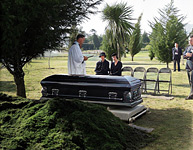
[Muskogee Dailey Phoenix, 8 June 1934]
Jackson Barnett Buried In Hollywood Cemetery, Far From Native Plains
Hollywood. June 7 - AP - Far from the rolling plains of his
native Oklahoma, Jackson Barnett, reputedly the world's wealthiest Indian, was
buried today in Hollywood cemetery. The Rev. Frank Gibson, and Episcopalian
minister, conducted brief services.
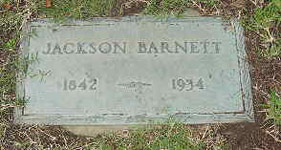
(Thanks to Allan Ellenburger) |
Accompanying the body to the final resting place was Mrs.
Anna Laura Lowe Barnett, who Wednesday won her court battle to prevent the government from
sending the aged Creek's body to Oklahoma for burial.
Mrs. Barnett, whose marriage to the Indian recently was annulled
in federal court, said she would prosecute her fight to obtain a widow's share
of the estate.
Barnett died May 29 of a heart ailment. He was 92
years of age. Funeral services were held May 31, but the government halted
burial plans, insisting his body be sent to his birth place for interment among
his tribal ancestors. Mrs. Barnett obtained a restraining order preventing
the undertaker from sending the body to Oklahoma.
The story continues...
Because Jackson and Anna's marriage was annulled shortly before Jackson's death Anna then had no effective legal claim to the estate as Jackson's "widow". Because of this, Jackson's estate then fell to his natural heirs.
The fight over Jackson's began in the local courts but because of the growing
claims to the estate the case was removed to the Federal Court of the Eastern District of Oklahoma in Muskogee presided by Judge Robert L. Williams. Immediately after Jackson's death the local and Federal Court began to be deluged with legitimate and phony claims to the estate.
The taking of depositions from over 600 claimants and witnesses around Oklahoma and even other states began in March 1935 and ended in February 1937. The trial to determine the heirs and live in-court testimony began in March 1937 and ended in June 1938. Throughout this time
Jackson's legitimate nieces, nephews, cousins had the tremendous task of
countering the many phony claims by filing legal briefs and presenting witnesses
to the contrary. In the beginning each individual legitimate niece, nephew
and cousin was presenting largely similar and complementary claims but
eventually they decided to join forces and present a united claim to help
counter the illegitimate claims. The most persistent phony claim was
from a Negro woman who claimed to have been married to Jackson and had a
child. Others were from supposed cousins in Tennessee and Kentucky.
Even before Jackson's death it was known to the government officials that there
were many unscrupulous people patiently waiting for the day Jackson died when they
would swoop in and make their "claim" to the estate. Also, some
persons with the Barnett surname were approached and induced by lawyers to try
and cash in on Jackson's fortune.
Finally, after 5 years of taking testimony and depositions from real and
alleged relatives who lived close and far and legal maneuvers from attorneys and government officials Judge Robert L. Williams came to a decision. On
16 Dec 1939 he filed his opinion in the case and on 2 Jan 1940 decreed and awarded half of the estate to Jackson's paternal nieces and nephews and the other half to his maternal cousins. The court's judgment was then appealed by the losing parties to the circuit
court and later Supreme Court to be tried but in both cases the initial court ruling was held valid, without further trial.
In July 1943 the Department of the Interior decreed that out of
Jackson's estate: $142,421.92 in cash, bonds valued at $207,160.09, and
$166,150.00 in other monies, for a total of $515,732.01 would be distributed
amongst the heirs. The 13 nieces and nephews each received $12,485.07 and
the cousins each received $9,710.61 more or less.
The $12,485.07 calculates to
about $130,000 in 2002 dollars or about $223,885 in 2022 dollars per the "US
inflation calculator"
See these records from the "Estate Case" (equity case
4556):
The "estate case" was not an actual "probate" case but a civil "equity case".
This
particular federal equity case dealt with Jackson's estate. The original
records are located in the SW National Archives in Fort Worth, Texas. They
are part of the "U.S. District Court records" (Record Group 21),
Eastern District of Oklahoma, equity case #4556.
• Index of persons who testified in the Jackson Barnett "estate case" 1935-1938+. This indexes the depositions and court testimony.
• Some miscellaneous testimony about Jackson's maternal relatives.
• Download a text database (53k) of the witnesses.
• Legal fillings made in the Jackson Barnett
"estate case". This is an incomplete list, 1934-1938 only.
• "Findings of fact and conclusions of law"
regarding the heirs of Jackson Barnett, July 18, 1938. A summary of all the claimants groups and who were judged the true heirs of Jackson Barnett.
• "Notice to Attorneys" in the Jackson Barnett Case about payments.
• Box list and location of the original
"estate case" records in the SW National Archives, Fort Worth, Texas.
• A scandalous Confidential Report about Anna Laura Lowe dated April 28, 1920.
•  A gallery of known Jackson Barnett related photographs.
A gallery of known Jackson Barnett related photographs.
There is also a considerable amount of information concerning the government's
internal affairs and their legal maneuvers regarding Jackson Barnett in the
"Records of the U.S. Attorneys and Marshals" (RG 118), Eastern
District & Western District, also in the SW
National Archives. There are dozens of boxes of original letters,
reports, and documents.
See these other sites that mention Jackson Barnett:
The History of Drumright Public Schools - Mentions Drumright oil field
Winners of the West article, 1938
"Tulsa World" article, 1982
"The Invasion of Indian Country in the Twentieth Century ..."
by Donald Fixico - Chapter one is about Jackson Barnett.
Mott vs. U.S. @ FindLaw.com
United States vs. Equitable Trust Co. of New York @ FindLaw.com
Congressional Records
• H. R. 4186: "To authorize the sale and conveyance of certain property of the estate of Jackson Barnett, deceased Creek Indian" (James F. O'Connor - Montana). Seventy-eighth Congress; Second Session (1944). Committee on Indian Affairs.
• S. 1710: "To authorize the sale and conveyance of certain property of the estate of Jackson Barnett, deceased Creek Indian" (Elmer Thomas - Oklahoma). Seventy-eighth Congress; Second Session (1944). Committee on Indian Affairs.
• Senate Report 820 (S. 1710): "Jackson Barnett, Deceased, Sale of Certain Property." Seventy-eighth Congress; Second Session (1944).
Back to CIR.




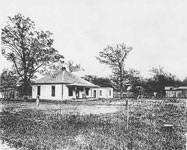
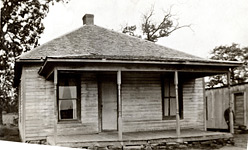





 RED AND WHITE UNION SUCCESS
RED AND WHITE UNION SUCCESS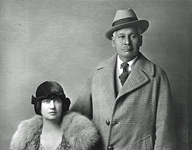
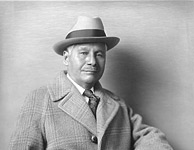
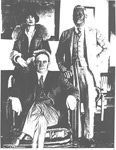
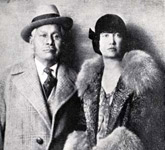
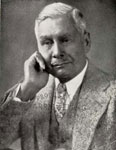
 By JESSIE
HENDERSON HOLLYWOOD. Jan. 10 (CPA) — Jackson Barnett, millionaire Indian chief,
has voluntarily become a Hollywood traffic cop. His appointment is not official.
Chief Barnett appointed himself. He's getting away with it, too. Nearly every
afternoon, the elderly Cherokee brave in business suit and black felt hat
stations himself on a corner of Sunset boulevard opposite his home. When he
became a millionaire, the chief picked on Hollywood as the most amusing place in
the world in which to settle down. He didn't want to go into pictures, he just
wanted a nice home on a central street where he could watch the Hollywoodians go
by. Toward that end he purchased a white colonial mansion with pillars.
By JESSIE
HENDERSON HOLLYWOOD. Jan. 10 (CPA) — Jackson Barnett, millionaire Indian chief,
has voluntarily become a Hollywood traffic cop. His appointment is not official.
Chief Barnett appointed himself. He's getting away with it, too. Nearly every
afternoon, the elderly Cherokee brave in business suit and black felt hat
stations himself on a corner of Sunset boulevard opposite his home. When he
became a millionaire, the chief picked on Hollywood as the most amusing place in
the world in which to settle down. He didn't want to go into pictures, he just
wanted a nice home on a central street where he could watch the Hollywoodians go
by. Toward that end he purchased a white colonial mansion with pillars.


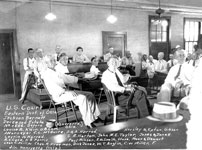
 A
A